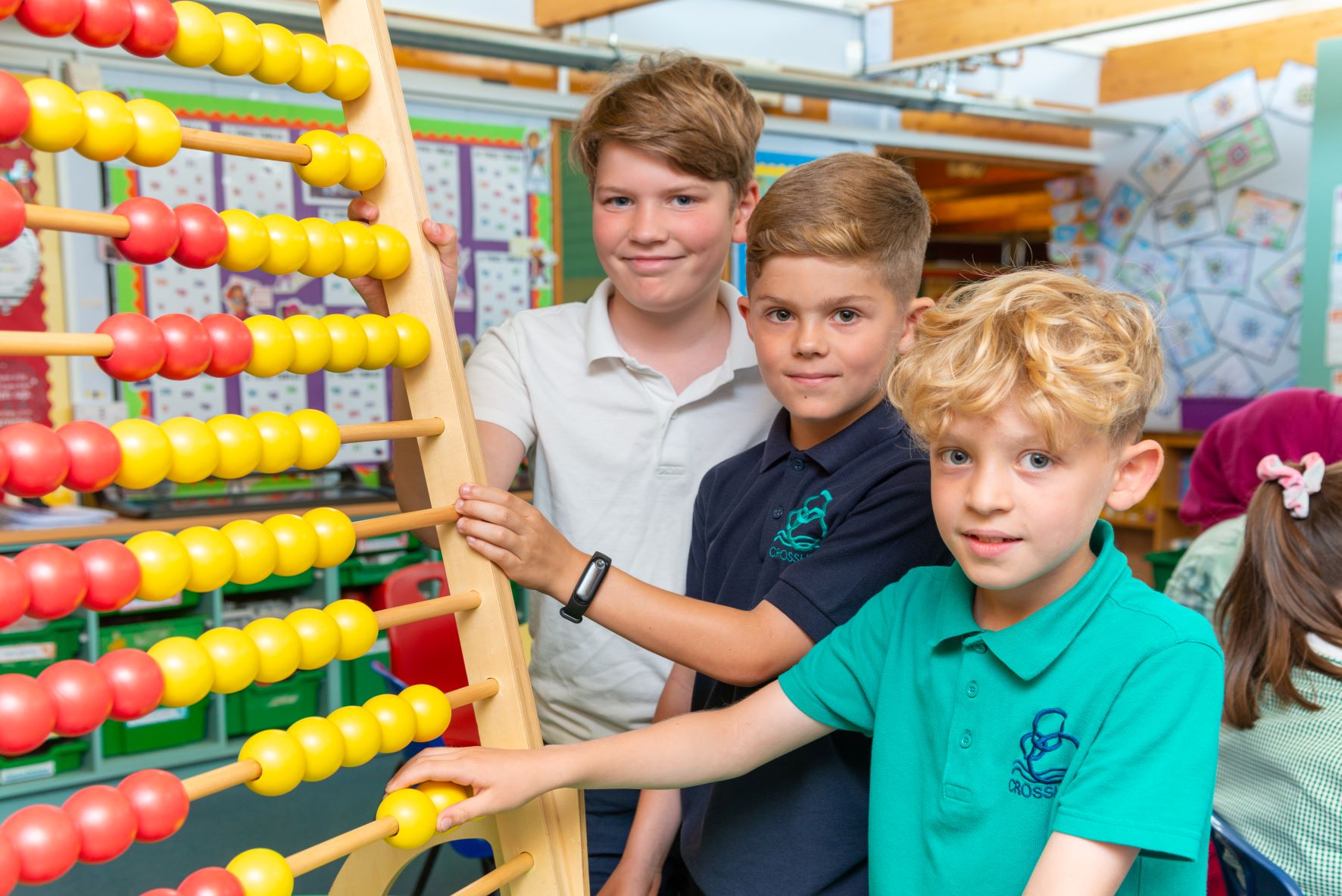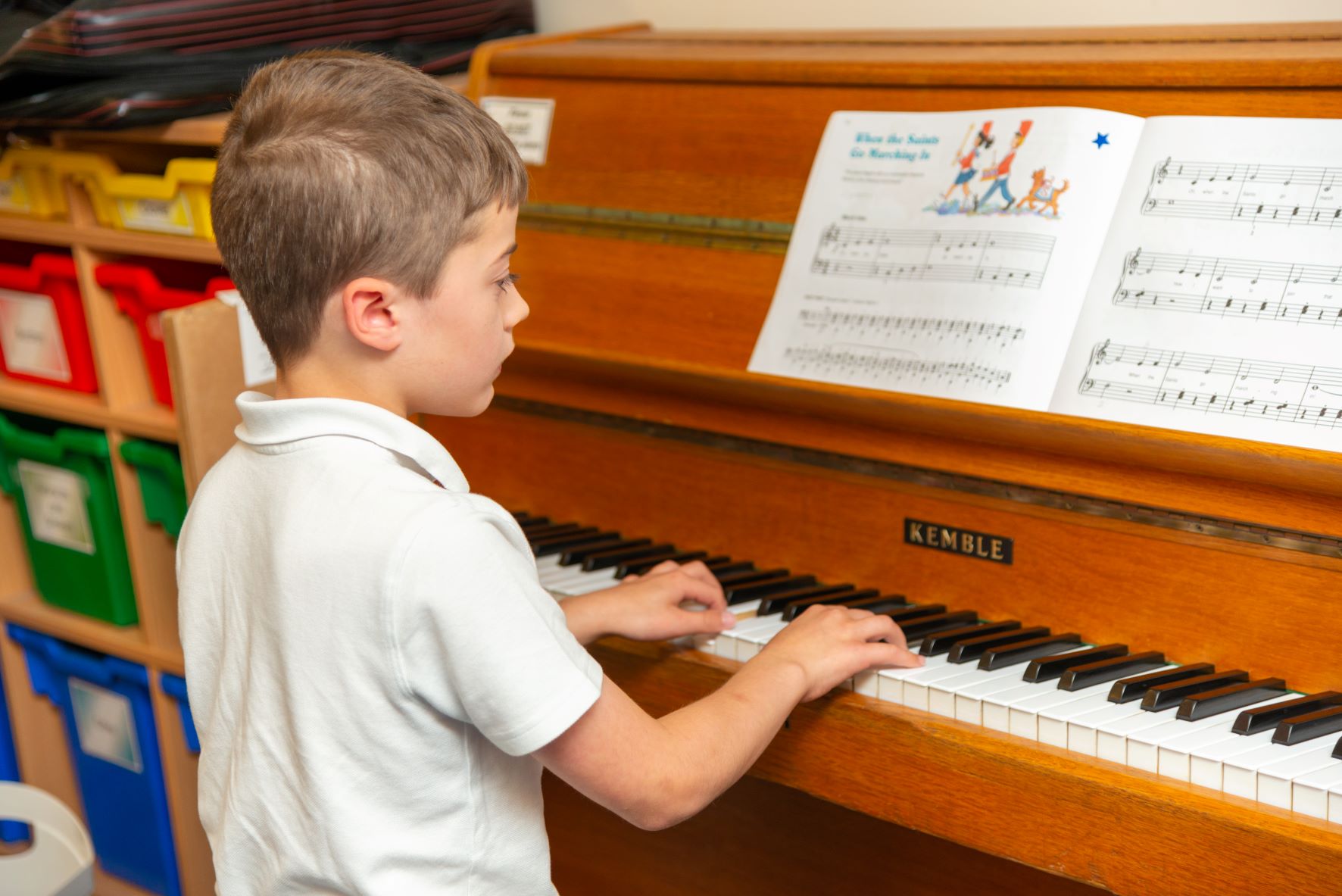How does the school know if pupils need extra help with learning?
There are four types of Special Educational Needs and Disabilities (SEND), decided by the department for education:
- communication and interaction
- cognition and learning
- social, mental and emotional health
- sensory or physical
Pupils are identified as having SEND in a variety of ways, including the following:
- liaison with previous school
- performing significantly below expected levels
- concerns raised by parent/carer
- concerns raised by teacher
- liaison with external agencies, e.g. physical health diagnosis from paediatrician
At Crosshall Junior School:
- pupils with Special Educational Needs and Disabilities (SEND) are enabled to access a broad, balanced and relevant curriculum as part of the whole school community
- pupils with SEND are educated in an inclusive environment alongside their peers
- pupils with SEND receive levels of additional support that are tailored to their individual learning difficulties
- we identify and assess pupils with SEND as early and as thoroughly as possible using the revised Code of Practice (2014)
- parents/carers and pupils are fully involved in the identification and assessment of SEND, we strive for close co-operation between all agencies concerned, using a multi-disciplinary approach
- we provide appropriate and flexible forms of educational provision, making the most efficient use of all available resources
- we maintain up to date knowledge of current SEND good practice and methodology
What should I do if I think my child has special educational needs?
If you think your child may have special educational needs:
- initially, contact the school office and arrange a meeting with your child’s class teacher to discuss your concerns
- if you need to meet with the Special Educational Needs Co-ordinator (SENDCO), Sarah Clee, again this can be arranged via the school office
How will school support my child?
The school will support your child in several ways:
- class teachers are trained to teach children with all types of additional learning requirements and are responsible for making the curriculum accessible to all pupils
- the SENDCO, Sarah Clee, will liaise with external experts
- the SENDCO will organise specialist training if required
- the SENDCO will ensure provision across the school is efficiently managed
- each year group provides a wide variety of intervention programmes that are tailored to the individual needs of pupils
Who will explain provision to me?
Provision will be explained in the following ways:
- information about the provision in each year group can be discussed with class teachers or team leaders
- in the case of individual or small group interventions, the SENDCO or Team Leader will write to parents/carers explaining the aims of the intervention
How are the school governors involved and what are their responsibilities?
The school governors are involved in SEND in the following ways:
- the SENDCO reports to the governors informing them about the progress of pupils with SEND; this report does not refer to individual pupils and confidentiality is maintained at all times
- a named governor is responsible for SEND and liaises with the SENDCO and reports to the governing committees, to keep all the governors informed
How will the curriculum be matched to my child’s needs? What are the school’s approaches to differentiation and how will that help my child?
The curriculum will be adapted to meet the needs of individual children in the following ways:
- class teachers are responsible for planning lessons that are accessible to and differentiated for every pupil
- lesson activities are tailored to individual needs and provide visual, auditory and kinaesthetic opportunities
- pupils may receive small group or individual support from a Teaching Assistant
- strategies including pre-teaching content or vocabulary and over-learning key facts will be employed if appropriate
- alternative activities may be set for home learning
- specially targeted texts and resources appropriate for pupils’ reading ages may be provided
- additional apparatus or materials, including specialist equipment and technology will be provided where necessary
- resources will be adapted so that they are accessible for pupils with specific learning difficulties
How will I know how my child is doing and how will you help me to support my child’s learning? What opportunities will there be to discuss my child’s progress?
There will be a number of opportunities to discuss your child’s progress:
- parents/carers are welcome at any time to make an appointment to meet with either the class teacher or the SENDCO to discuss how their child is progressing
- parents/carers can contact staff through the school office
- there are two Learning Review Parent Consultation opportunities every academic year
- the school also has a written report programme
- if your child has an Education, Health and Care Plan (EHC Plan) or Statement of Special Educational Needs, then there are legal requirements for at least one formal meeting each year (the Annual Review) organised by the SENDCO and attended by parents/carers, teachers and outside agencies involved in the pupil’s education
How does the school know how well my child is doing?
Children’s progress is monitored in the following ways:
- teachers monitor and review all pupils’ progress throughout the year
- data collection takes place each term, showing the current attainment of all pupils
- teachers and team leaders track the progress of pupils across the school year and intervene if pupils experience difficulties
- in the case of intervention programmes, progress is regularly reviewed, which might include testing or screening. These programmes are reviewed by the SENDCO and Team Leaders, who use the information to plan and design the next half term’s intervention programme according to the needs of individual pupils
- in-class additional support is regularly reviewed by the SENDCO and Team Leaders
- Teaching Assistants and teachers work together on a day-to-day basis, planning and reviewing lessons
- teachers are observed by senior leaders and line managers as part of the school Managing Performance and Progress system;
- the Assistant Heads are responsible for whole school data and tracks the school’s progress against national standards
- this process allows us to accurately identify when pupils may need further support, intervention, or additional assessment to detect any underlying difficulties
What support will there be for my child’s overall wellbeing? What is the pastoral, medical and social support available in the school?
Children’s overall well being is supported in the following ways:
- the school uses a positive behaviour management system, which is based on simple rules, rewards and fair and consistent consequences
- children’s learning is extended beyond the standard curriculum through the Future Me programme. Each child has a booklet outlining pledges under seven categories: Excellence, Independence and Determination; Entrepreneurship and Innovation; Team Work and Friendship; Respect for Yourself, Globally and the Environment; Behaviour; Courageous Leadership and Voluntary Work. The aim of the programme is to value and promote the skills that are essential for a successful adulthood and to develop and nurture these talents, which may be hidden as part of the regular curriculum
- in addition, senior pupils are trained as Peer Mediators to support younger pupils during playtimes
- Teaching Assistants lead intervention groups and provide 1:1 support with Assertiveness, Emotional Maturity and developing Social Skills. Sessions with a play therapist may be provided where appropriate
- if a pupil is unwell during the school day, then they will be taken to the Medical Room, which is run by trained First Aiders. If the pupil is too ill to stay at school, their parent/carer will be contacted and asked to make arrangements for collecting them as soon as possible
- in a medical emergency, a First Aider will attend and may call for an ambulance if necessary
- where appropriate and in discussion with their parent/carer, pupils may be allocated sessions with a learning mentor
How does the school manage the administration of medicines?
Medicines are administered in the following ways:
- the school recognises the importance of supporting pupils with medical needs
- we ensure that pupils receive proper care and support at school so that their condition can be managed, they can access the curriculum and maintain regular attendance
- we promote close co-operation between the school, parents, health professionals and other agencies, to provide the right environment for pupils with medical needs
- training is provided when necessary to meet the needs of individual pupils
What support is there for behaviour, avoiding exclusion and increasing attendance?
Pupils with SEND who exhibit challenging behaviour will receive significant support in order to avoid exclusion. This may include:
- assessment of their needs in school and where necessary involving a range of specialists
- meetings with parents
- if appropriate, additional support from a Teaching Assistant may be provided
- if appropriate, play therapy sessions may be arranged
- if appropriate, an individual behaviour programme may be put in place
How will my child be able to contribute his/her views?
Your child will be able to contribute their views in a variety of ways:
- at the weekly Birthday Thursday meeting the children are asked their views regarding a range of topical subjects
- there is an 'open-door policy' with easy access to the Headteacher, SENDCO or indeed any member of staff
- termly surveys are issued and discussed
- curriculum sampling takes place annually, whereby each subject leader speaks to a range of children from every year group, about their views of the curriculum
- children are also asked their views as necessary, for example: the introduction of Future Me and the re-launch of the house system
- the children’s Year Six Ambassadors also take on a proactive role in support of their peers and this is used as an informal pathway to airing views
- when pupil’s Individual Educational Action Plans (IEPs) are reviewed, these are discussed with them and their view is recorded. Pupils with a Statement of Special Education Needs or a Education and Health Care Plan (EHC Plan) are invited to prepare a report ready for their Annual Review and encouraged to attend the review to share their views
What specialist services and expertise are available at or accessed by the school?
The SENDCO (Sarah Clee) liaises with many specialist services and outside experts, to ensure provision for our pupils is appropriate and meets all needs:
- every member of staff is involved in supporting all children but the SEND team of teaching assistants and learning mentors is led by the SENDCO
- the school works closely with any external agencies that are relevant to individual pupils’ needs
- for learning needs we liaise with Specialist Teacher Advisors
- for health needs we liaise with paediatricians, the school nurse team, clinical psychologists and psychiatrists, speech & language therapists, play therapists, occupational therapists, physiotherapists, visual and auditory impairment specialists
- for social needs we liaise with Social Services, locality teams, social workers, child protection teams and family intervention programmes
- for language or cultural needs we liaise with the Cambridgeshire Race Equality and Diversity Service
What SEND training have the staff had or are currently having?
SEND training forms part of the continuing professional development of all teachers and Teaching Assistants and is organised in accordance with the needs of the pupils.
How will my child be included in activities outside the classroom including school trips?
A variety of activities outside the classroom including school trips take place:
- all pupils are included in all parts of the school curriculum and all pupils are included on school trips
- we will provide the necessary support to ensure that this is successful
- individual risk assessments may need to be carried out and discussed with parents/carers, to ensure every individuals needs are met
How accessible is the school environment?
The school environment is made accessible to children in the following ways:
- Crosshall Junior School is all on one level and so there are no steps or stairs to negotiate for wheelchair users
- there are purpose built hygiene and therapy rooms fitted with a hoist system on site
- there is a sensory room and staff are trained in meeting sensory needs
- specifically, we have staff who are highly trained in meeting the needs of visually impaired pupils
- we are an ADHD, Autistic Spectrum, Dyslexia and Dyspraxia friendly school
- for pupils with hearing difficulties, we liaise closely with the hearing impairment team to locate the most acoustically appropriate locations for each individual as they progress through the school
- for pupils with visual impairments, we liaise closely with the visual impairment and mobility teams to ensure it is possible for them to move safely and confidently around the school, as independently as possible
How will the school prepare and support my child when joining the school and transferring to a new school?
Smooth transitions are ensured in the following ways:
- our aim is to make sure our new pupils feel like they belong at Crosshall Junior School Academy Trust even before they officially arrive because learning is most effective when pupils feel they belong and are comfortable in the school environment
- all pupils joining Year Three are invited to a taster morning with their new class and teacher
- parents/carers are invited to an evening event to learn about the school and to meet key members of the teaching team
- the SENDCO is available to speak with parents at this event
- Year Three teachers and the SENDCO liaise with the staff at Crosshall Infant School Academy Trust and other feeder schools to discuss the individual needs of the pupils
- when pupils join the school at another point in their academic journey, they and their parents are invited to visit and meet staff and pupils from the year group they will join; where appropriate, the SENDCO will liaise with their previous school
- as pupils prepare for secondary school, the school can arrange additional transition sessions for pupils at their chosen secondary school site
- SENDCOs from the relevant Secondary Schools attend Year Six Annual Reviews
How are the school’s resources allocated and matched to children’s needs?
Resources are allocated in the following ways:
- decisions are made based on individual needs
- we have a creative, inclusive approach toward resources and have a wide range of resources to enable pupils to access school life and the curriculum
- we have a sensory room, a purpose built therapy and hygiene room and a highly skilled staff in meeting the needs of pupils with significant physical disabilities
- we take an innovative approach toward utilising the latest technology to meet the needs of individual pupils
How is the decision made about what type and how much support my child will receive?
Decisions are made in the following ways:
- provision is tailored to meet pupils’ needs
- this approach reflects the fact that different pupils require different levels of support
- the SENDCO liaises with parents/carers, class teachers, Team Leaders and Teaching Assistants, to identify the appropriate support
How do we know if the support my child has received has had an impact?
The impact of support your child has received will be monitored in the following ways:
- regular assessment provides evidence of the progress individual pupils are making academically against national/age expectations
- individual targets are set and reviewed regularly
- formal or informal observations of the pupil enable progress in non-curriculum skills to be measured
- pupils may move off the SEND register when they have made sufficient progress
- information is shared with parents/carers via two parent consultation evenings, written reports and a formal annual review for all pupils with an EHC plan; meetings can be arranged with the SENDCO and class teacher, as required, by contacting the School Office
Who can I contact for further information?
For further information:
- contact the school office to make an appointment with your child’s class teacher or Sarah Clee, the SENDCO to discuss any concerns
- school policies - Special Educational Needs and Disabilities; Accessibility Plan and Admission Arrangements.
- parents/carers can also view Cambridgeshire’s Local Offer at: www.cambridgeshire.gov.uk/SEND





